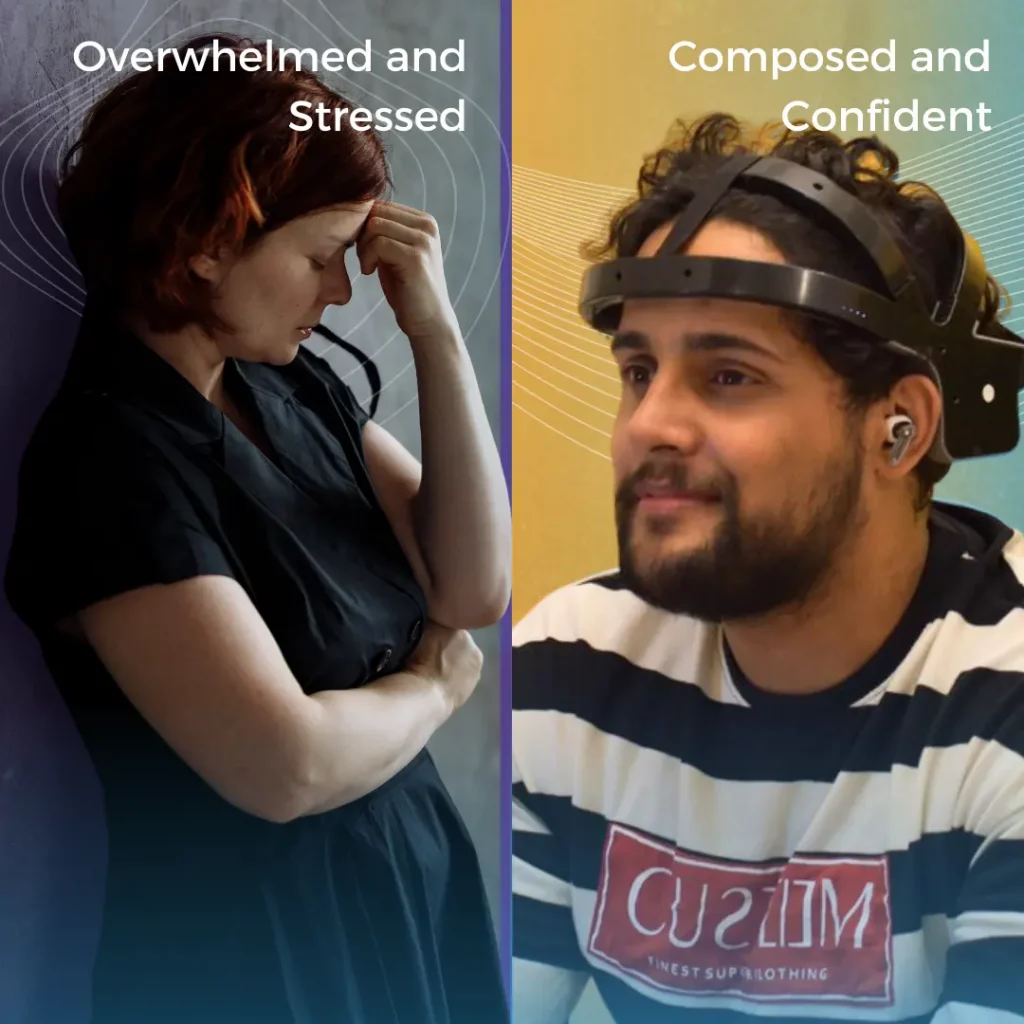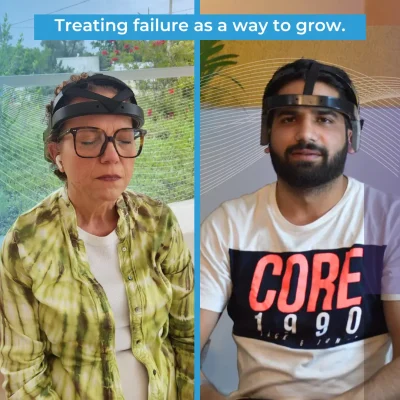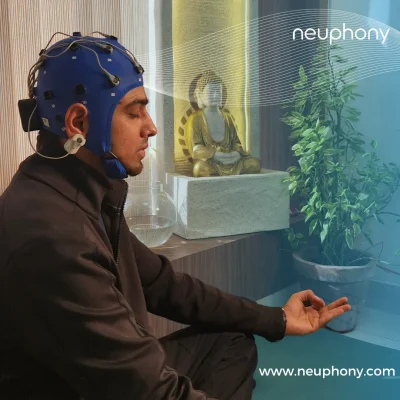Neuphony Research Team | Published on October 5, 2024 | 6 Mins Read
Picture this: Two individuals face the same challenging situation. One crumbles under the pressure, while the other tackles it head-on, seemingly unfazed. What’s the secret ingredient that sets them apart? It’s resilience – the ability to bounce back from adversity and perform at your best even in the face of stress.
In this blog, we’ll explore the concept of resilience, its role in our lives, and how it can be a game-changer for athletes, entrepreneurs, and everyday individuals. Plus, we’ll introduce you to a simple tool, Neuphony, that can help you track your resilience journey.

Resilience is like your mental and emotional armor. It’s what empowers you to face life’s challenges without breaking down. Think of it as your inner strength, your ability to endure, adapt, and thrive, even when things get tough. Resilience is not about avoiding stress; it’s about how you react to it. It’s the inner voice reassuring you, “I’ve got this.”
Resilience plays a pivotal role in our lives. It’s the key to handling stress effectively. When you’re resilient, stress becomes a manageable pressure rather than an overwhelming force. It enables you to stay calm under pressure, make better decisions, and maintain your physical and mental well-being.
Resilience isn’t just for athletes and entrepreneurs. It’s an essential skill for navigating our daily lives. Whether it’s dealing with a difficult boss, handling family issues, or managing your workload, resilience helps you maintain balance and composure.
Stress is a part of life, but how you respond to it makes all the difference. Resilience is your secret weapon for managing stress. It helps you avoid burnout, maintain good mental health, and stay focused on your goals.

Now, the million-dollar question: Can you build resilience? Absolutely! Just like physical strength, resilience can be developed over time. An effective method is practicing positive self-talk. When you face adversity, remind yourself that you’re capable of handling it. Embrace challenges as opportunities for growth, not as insurmountable obstacles.
Building resilience is like strengthening a muscle. It takes time, effort, and consistent practice. One of the fundamental steps is developing a growth mindset. Welcome challenges as chances for personal growth rather than viewing them as dangers. Establish attainable goals and take time to acknowledge your achievements, regardless of how modest they might appear. Surround yourself with a support system of friends and family who uplift and encourage you.
Another crucial aspect of building resilience is self-care. Make sure you’re getting enough rest, eating well, and engaging in regular physical activity. These simple lifestyle choices can have a profound impact on your ability to handle stress.
Furthermore, consider seeking guidance from a therapist, counselor, or visiting Neuphony brain gym. They can provide you with strategies and techniques tailored to your unique needs. Keep in mind, building resilience is a path, not a final stop. Be patient with yourself, and over time, you’ll find that you’re better equipped to face life’s challenges with confidence and grace.

Now, let’s talk about how to build resilience with Neuphony. It’s a skill that can be honed with practice and self-awareness. One powerful technique is mindfulness. By staying present and focusing on the here and now, you can better manage stress and build resilience. Moreover, Neuphony can be a valuable ally on this journey. It provides you with insights into your thought patterns, helping you recognize negative self-talk and replace it with positivity.
By consistently using Neuphony to track your progress, you’ll have a clear picture of your resilience growth, making it easier to make necessary adjustments and become even more resilient over time. Remember, building resilience is a journey, and with the right tools and mindset, you can strengthen your ability to thrive in the face of adversity.
Athletes and entrepreneurs are perfect examples of how resilience can make or break success. Consider an athlete who faces setbacks, injuries, or tough competition. Their ability to bounce back and keep pushing forward, despite the odds, is what sets them apart as champions. Similarly, entrepreneurs face numerous challenges – from financial setbacks to market competition. Resilience allows them to adapt, learn, and ultimately thrive.
Now, let’s dive into the world of athletes to witness how resilience plays a crucial role in their performance. We conducted sessions with two remarkable individuals – a swimmer and a shooter. By analyzing their data, we can draw valuable insights into resilience and how Neuphony can help.
We began with a swimmer, exploring his brain activity patterns and cognition during various swimming-related activities. His baseline focus score stood at 55.00%, indicating a decent level of concentration. The calm score at baseline was an impressive 71.43%, highlighting his ability to stay composed.
During a sport visualization exercise, where he mentally placed himself in the swimming arena, his focus score skyrocketed from 55% to a remarkable 95.53%. However, things took a turn during stress induction. Recalling a challenging moment from his sport, his calm score plummeted to 0%, revealing a struggle to stay composed under pressure.
The crucial part came during relaxation. By visualizing how he coped with stress and negative stimuli, his calm score bounced back to 33.67%. The takeaway? This athlete boasts incredible mental focus but needs to work on stress management and quicker relaxation techniques to maintain peak performance during competitions.
Next, we explored the world of shooting sports with another talented athlete. Similar brain activity analysis unveiled a baseline focus score of 27.69% and a calm score of 43.71%.
During sport visualization, where he envisioned himself in the shooting arena, his focus score surged from 27.69% to an astounding 95.40%. In this aspect, he excelled. However, the shooter faced challenges during stress induction. Recollecting a difficult moment in his sport, his calm score dipped from 43.71% to 30.86%.
The defining moment was relaxation. Engaging in a mental body scan exercise, his calm score climbed from 30% to 62.29%. This shooter displayed remarkable mental focus, quick stress recovery, but an opportunity to enhance his calm scores during relaxation and baseline activities.
These athlete case studies highlight the importance of resilience in sports. Resilience isn’t just about bouncing back from setbacks; it’s about maintaining focus and composure in high-pressure situations. By using tools like Neuphony, athletes can track their resilience journey, identify areas for improvement, and tailor their mental conditioning to enhance their performance.
Remember, resilience is a skill that can be honed, whether you’re diving into a pool or aiming for the perfect shot. It’s about acknowledging your strengths and recognizing where you can grow. So, take inspiration from these athletes, embrace resilience, and embark on your own journey towards peak performance and stress management.